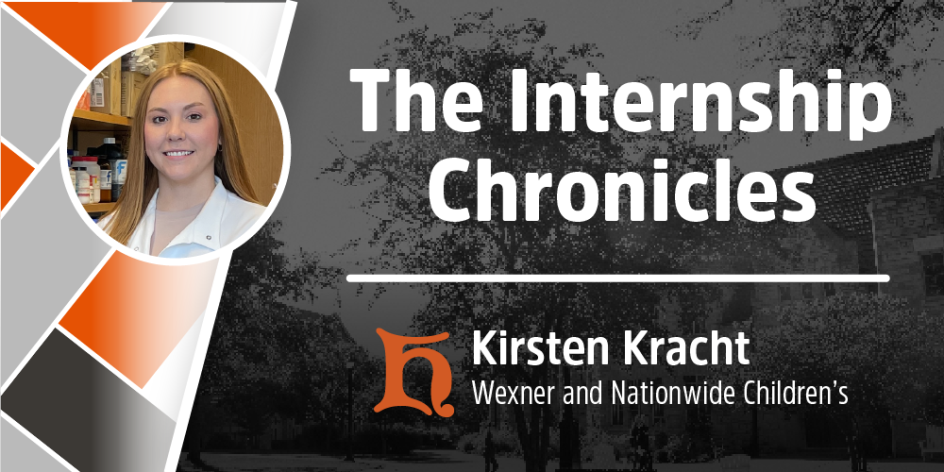
One summer day, a Student Prince decided to go on a little adventure. “It won’t be long before I have a career,” the Prince said, “so I’d better start preparing now.” So with some ’Berg education under their hat, and some connections in their back pocket, the Student Prince began forging their way through an internship.
We continue our web series, Internship Chronicles.
Chapter 40: Do Not Let Failure Deter You from Your Goals
Kirsten Kracht is a biochemistry major with a pre-medicine concentration from Delaware, Ohio. She’s also studying German and Biology as double minors. After Heidelberg, she plans to pursue a PhD in biomedical engineering, with hopes of entering a career in organ transplantation research. She wants to research the use of stem cells to solve the transplantable organ crisis. This summer, she got closer to solving this crisis through an internship at the Vaccines and Immunology Department of the Abigail Wexner Research Institute and Nationwide Children’s Hospital in Columbus, Ohio.
How did you find your internship, or how did the internship find you?
My Principle Investigator (PI), Dr. Peeples, came to Heidelberg this past spring to give a presentation on Respiratory Syncytial Virus and the vaccine his lab is working on. I found his talk to be extremely interesting and inspiring. When my professor, Dr. Pruneski, approached me the following week saying Dr. Peeples was looking to have an undergraduate intern in his laboratory over the summer, I naturally said I was very interested. I worked with Dr. Pruneski to better my CV and compose an email to Dr. Peeples. Dr. Peeples responded that he would love to have me in his lab over the summer, and that I would get started soon after I was home
What did you expect from your internship initially?
I expected to learn a lot. I knew Dr. Peeples had a couple of research scientists in his lab, and I was expecting to follow them around for a while, learning as much as I could, before I began my own project. I had not experienced research in a professional setting, so I expected that I would learn the process that goes into conducting research and writing papers. Naturally, I expected to learn so much more about the deadly Respiratory Syncytial Virus and the efforts going in to combat it.
What really happens in your day-to-day work?
My days were always different. I would either start by shadowing the research scientists as they worked on their projects, or I would start by doing my project. My project consisted of double digestion, ligation, gel electrophoresis, bacteria transformation, mini bacterial cultures, maxi bacterial cultures, and DNA extraction. Once my project began, I was always working on some part of my procedure. If I was not shadowing or doing my own research, I would read journal articles to learn more about the virus and the vaccine efforts. Every Monday, Wednesday, and Friday I would passage the HeLa cells that I worked with and help with media changes for the other cell cultures.
What connections have you made?
The connections I made this summer were unlike any other. I was able to learn from so many great scientists, whom I still keep contact with, and witness all of the amazing work they are doing. I was able to learn from Dr. Peeples, who has dedicated his life to the vaccine efforts and helping children across the world. I am so grateful for all of the people I got to meet and learn from.
What is the most valuable thing you’ll bring back to the classroom after this experience?
The most valuable thing that I will bring back to the classroom is the knowledge and experience I gained this summer. My laboratory skills increased immensely, and I was able to add on techniques, such as cell culture, bacteria culture, and DNA extraction to name a few.
If your internship was a book or a chapter in a book, what should it be titled?
If my internship was a book, I would title it "Do Not Let Failure Deter You from Your Goals" because so many procedures in research fail and you have to make minor tweaks to perfect it. It is just like life where so many things go wrong, and it's how you adjust and respond that makes it all worthwhile.
To keep up with Kristen’s career, check out her linkedin!
For more information on nationwide children’s ongoing research efforts, check out their website.